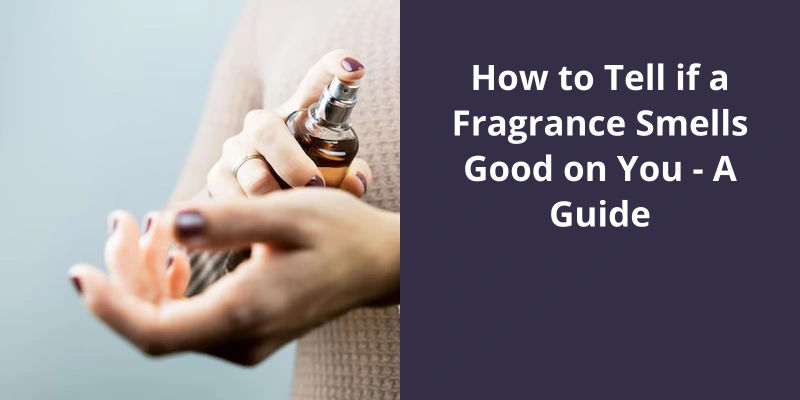To tell if a fragrance smells good on you, the first thing you need to do is spray it on your wrist, not on a paper strip, and give it time to precisely react with your body’s natural oils and pH. Smells can change significantly after a few minutes or hours, so patience is key. It’s also important to consider the environment as your scent can change depending on the temperature, your diet, and even your mood. Always remember less is more. Start by applying a small amount, it’s far easier to add than to subtract. Finally, get an opinion. Ask a trusted friend or family member, they can provide a fresh perspective. So, choose wisely, test patiently and evaluate discerningly.

How Do I Know if People Can Smell My Perfume?
While it may be difficult to tell if people can smell your perfume, there are a few things you can do to ensure that your fragrance is still noticeable to others. One option is to smell yourself – take a sniff of your wrist or other pulse points to see if you can still detect the scent. Another option is to discreetly ask a trusted friend or family member if they can smell your fragrance.
In addition to these methods, it’s also important to consider factors that may affect the longevity and potency of your perfume. For example, exposure to heat, moisture, and sunlight can all cause fragrances to degrade and become less noticeable over time. Similarly, wearing too much perfume or applying it to inappropriate areas – such as the hair or clothing – can also affect how well others can smell your fragrance.
If people compliment you on your fragrance or ask what you’re wearing, it’s a good sign that your perfume is noticeable and appealing. Conversely, if people seem to avoid standing too close or react negatively to your fragrance, it may be a sign that you need to adjust your application or choose a different scent altogether.
To ensure that your perfume is always noticeable and appealing, it’s also important to choose a scent that complements your natural body chemistry and personal style. Consider factors like the notes and intensity of the fragrance, as well as the occasion or setting in which you”ll be wearing it. And don’t be afraid to experiment with different scents until you find the perfect one for you. With a little bit of trial and error, you can be sure that your perfume will always be noticed – in the best possible way.
Therefore, it’s crucial to understand how individual body chemistry affects the scent of perfume to make informed decisions when selecting fragrances. In this article, we delve deeper into the science behind how body chemistry impacts perfume, various factors that influence personal scent, and tips on how to find the perfect fragrance for your body chemistry. Read on to find out more.
Does Your Body Chemistry Affect Perfume?
The oil and sweat produced by our skin can have a significant impact on the way a perfume smells on us. For example, someone with an oily complexion may find that a fragrance becomes overly intense or cloying when layered onto their skin. Alternatively, a person with dry skin may find that a perfume fades too quickly and doesn’t last throughout the day. These differences in body chemistry make it important for people to test fragrances on their skin before buying them.
The pH levels of the skin can also have an effect on perfume. A persons pH level is determined by the acidity or alkalinity of their skin, and can vary based on factors such as diet and genetics. A fragrance that smells great on someone with an acidic pH level may not work as well on someone with an alkaline level. This means that even two people with similar skin types can experience the same perfume in different ways.
When we sweat, the moisture can react with the fragrance molecules and alter the scent. This can lead to a perfume smelling differently on a hot, humid day versus a cooler, drier day. Similarly, our body temperature can affect how a fragrance develops and lingers on the skin.
Studies have shown that womens menstrual cycles can alter their sense of smell, which in turn can affect the way a fragrance smells on them. Additionally, women who’re pregnant or going through menopause may find that the same perfume smells different during these hormonal shifts.
How Do Different Types of Fabrics and Clothing Materials Affect the Way Perfume Smells on the Body?
The type of fabric and clothing material used can affect the diffusion and longevity of perfume on the body, as well as how it smells due to chemical interactions with the fibers. For example, porous materials like cotton and linen can absorb and hold onto fragrance more, while synthetic materials like polyester can cause the scent to evaporate more quickly. Additionally, some fabrics may alter the scent of the perfume due to their natural odor or chemical composition.
Source: How Body Chemistry Affects Perfume Fragrance – Mocemsa.com
By trying a fragrance on your skin, you’ll be able to determine which scent works best for you. It’s important to remember that a perfume can smell different on each person due to individual body chemistry. Therefore, the best way to find your perfect scent is to embrace the trial-and-error process. Ready to discover your signature scent? Keep reading to learn more.
How Do You Know What Perfume Smells Best on You?
This allows you to see how the fragrance develops on your skin and ascertain whether it compliments your natural scent or if it clashes. Some fragrances can be overpowering, while others may be too subtle, so it’s crucial to find a balance that suits you. Additionally, it’s important to take into consideration when and where you’ll be wearing the perfume. Are you going to a formal event or a casual get-together? Do you want to wear it during the daytime or at night?
Another way to determine which perfume smells best on you is to consider it’s ingredients. Some perfumes are made with floral notes, while others have woody or spicy undertones. Depending on your personal preference, you may find that you’re drawn to a certain type of scent. For instance, if you love the smell of fresh flowers, you may prefer a perfume that contains jasmine, rose, or lily of the valley.
Certain fragrances are also known for their longevity. If you want a perfume that lasts all day, opt for one with an oilier base, which tends to stick to the skin for longer. Conversely, if you prefer a lighter fragrance that isn’t too overpowering, choose a scent with a lower concentration of perfume oil. You may also want to test out several fragrances on different days to see which ones stay on your skin the longest and maintain their scent throughout the day.
If you love the way a fragrance smells on your skin and it makes you feel confident and beautiful, that’s the most important factor. Dont be afraid to try new fragrances and experiment with different scents to find the perfect one for you. With a bit of trial and error, youll soon discover the ideal fragrance that brings out the best in you.
The Role of Skin Type in How Perfume Smells on You (e.g. Oily Skin Versus Dry Skin)
- Oily skin can enhance the strength and longevity of perfume, making it last longer on the skin.
- Dry skin may cause perfume to evaporate faster, resulting in a weaker scent.
- Combination skin may have different results depending on the areas of the skin.
- Perfume reacts differently to different skin chemistry, so it’s always recommended to try a scent on your own skin before purchasing a full bottle.
- Factors such as diet, medications, and hormones can also affect how perfume smells on your skin.
Our sense of smell is one of the most powerful triggers of memories, and a signature scent can serve as a unique and intimate way to create lasting impressions on those around us. Whether it’s a subtle fragrance that only those closest to us can detect or a bold scent that leaves a lasting impression on everyone we meet, it’s important to choose a fragrance that truly reflects our personality and makes us feel confident and authentic. In this article, we will explore the importance of finding the perfect signature scent and how it can enhance our personal style and leave a lasting impression on those around us.
Why Is a Signature Scent Important?
Moreover, a signature scent can communicate a lot about someones personality and mood. It can symbolize their confidence, femininity, elegance, or even their sexuality. It speaks about their unique identity, and can serve as a silent communication tool to express their moods, feelings, and attitudes without saying a word.
Many of us have memories associated with certain fragrances, be it our mothers perfume, our grandmothers rose-scented lotion, or our first loves cologne. These scents can evoke happy memories and warm feelings that make us feel safe, loved, and connected to our past.
It can communicate our personality, enhance our mood, boost our confidence, and serve as a source of comfort and nostalgia. Whether we prefer floral scents, fruity scents, woody scents, or musky scents, the key is to choose a fragrance that resonates with our unique taste and reflects our authentic self.
Our sense of smell is a powerful tool that helps us navigate the world around us, from identifying potential dangers to recognizing familiar scents that bring us comfort. And while we may not always be aware of it, every person has their own natural scent that’s as unique as their fingerprints. This is because there’s a significant genetic component to body odor, making it difficult for even trained sniffer dogs to distinguish between identical twins who’re on the same diet. But while we may be similar in some ways, our individual scents set us apart and can tell a lot about who we are.
Do People Have Their Own Natural Scents?
The natural scent of humans can be influenced by a number of factors, including genetics, diet, hygiene habits, and individual bacterial populations. Each persons unique scent can be traced to the chemicals that their bodies produce, such as pheromones and other volatile organic compounds. These compounds can be detected by other humans, and can contribute to the way that individuals perceive and interact with each other.
While many people may try to mask their natural scent with perfumes or deodorants, there’s still a great deal of variation between individuals. Some people may have a naturally strong or pungent odor, while others may have a more subtle or mild scent. Additionally, factors such as age, gender, and health status can also influence a persons body odor, making it difficult to predict or control.
Overall, the study of human body odor is a fascinating and complex field that’s still relatively new. As scientists continue to learn more about the chemicals and processes that contribute to our natural scents, it’s likely that we will gain a better understanding of ourselves as individuals and as a species. Whether we’re trying to attract mates or simply coexist in crowded spaces, our sense of smell plays a crucial role in shaping our interactions with the world around us.
The Evolution of Human Body Odor
- Apocrine sweat glands evolve in early humans around 1.8 million years ago
- These glands produce a thicker and more oily sweat than eccrine glands
- Apocrine sweat combines with bacteria on the skin’s surface, producing body odor
- Body odor may have served as a marker of individual identity in early human social interactions
- As humans evolved and migrated to different climates, body odor may have played a role in mate selection and identification of strangers
- Modern hygiene practices have diminished the importance of body odor in social interactions, but it still persists as a phenomenon
Conclusion
Embrace the journey of discovering your perfect scent and allow yourself to indulge in the pleasure of wearing a fragrance that complements and enhances your natural essence.




